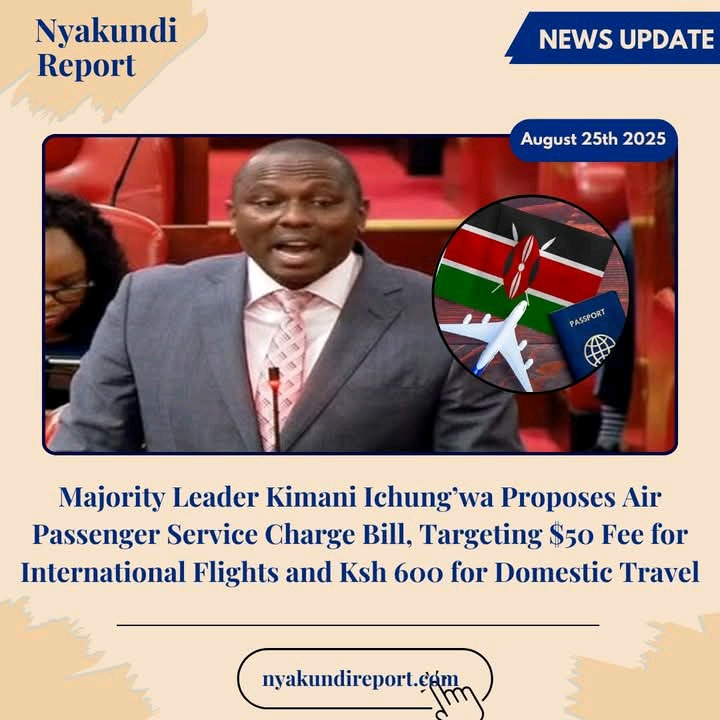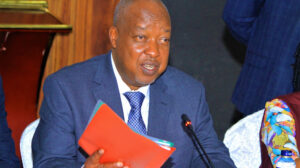Kimani Ichung’wah’s latest push in parliament has once again placed him at the center of public debate.
The National Assembly Majority Leader is sponsoring the Air Passenger Service Charge (Amendment) Bill, 2025, which seeks to alter the distribution of funds collected from travelers.
The current system already charges passengers USD 50 for international flights and Ksh 600 for domestic flights. What the bill intends to do is expand the list of beneficiaries beyond the Kenya Airports Authority, Kenya Civil Aviation Authority, and Kenya Tourism Board, by adding the Tourism Fund and the Kenya Meteorological Service.
The stated goal is to boost areas like aviation safety, tourism, and weather forecasting. Ichung’wah argues that these services are essential for both travelers and the economy.
However, critics question the logic of slicing revenue into more pieces when existing beneficiaries are already struggling with limited resources.
Some point out that these agencies are already supported by taxpayer money, so directing more of the service charge to them could dilute funds meant for urgent improvements such as airport infrastructure and passenger safety.

Others warn that creating additional beneficiaries without clear accountability mechanisms could open the door to misuse, especially in the case of the Tourism Fund which has raised concerns about transparency.
This debate is not new for Ichung’wah. In 2024, he was one of the most vocal defenders of the Finance Bill that proposed new taxes on essential goods, sparking protests across the country. Many Kenyans accused him of being disconnected from the reality of economic hardship.
Years earlier, he had also been criticized for pushing steep increases in traffic fines, a move that many described as punitive rather than corrective.
His closeness to President William Ruto has often amplified these controversies, with opponents accusing him of shielding the government from scrutiny while dismissing concerns about issues like inequality, corruption, and even police brutality.
Public reaction to the new bill has been swift and overwhelmingly negative on social media. Many Kenyans are questioning the timing, asking why the government is expanding fund allocations when citizens are struggling with inflation, unemployment, and high fuel costs.
Some users on X have mocked the idea of a “shadowy Tourism Fund,” saying it could easily become another avenue for looting instead of helping the sector. Others have compared the move to Tanzania’s expensive arrival fees, warning that Kenya risks discouraging both domestic and international travel.
The aviation industry could face serious effects if these concerns are ignored. Domestic flights are already costly for ordinary Kenyans, with prices sometimes going up to Ksh 22,000 due to limited competition.
Adding pressure on airlines to cover more levies might eventually trickle down to passengers, making flying even less affordable. Critics argue that essential services like weather forecasting should be funded directly from the national budget instead of piling more charges on travelers.
With the bill now moving through parliament, the government has a chance to engage the public and show transparency. Ignoring the outcry could reignite tensions similar to those seen during the Finance Bill protests.
For many Kenyans, this proposal is less about aviation and tourism and more about whether leaders are prioritizing citizens’ struggles or simply adding more layers of bureaucracy.
The question remains whether this bill will genuinely strengthen critical services or just spread resources too thin at the expense of those already burdened by the high cost of living.





















Add Comment